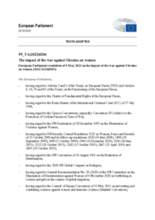Displaying 1821 - 1830 of 14579
This study provides an overview of the family reunification process of Latinx adolescents who have migrated to join their families in the United States.
This is a summary of what was said by UNICEF's Regional Advisor - Child Protection for Europe and Central Asia, Aaron Greenberg – to whom quoted text may be attributed - at a press briefing at the Palais des Nations in Geneva.
There were an estimated 100,000 children in Ukraine’s institutions before Russia’s war on Ukraine which began in February 2022.
The European Parliament adopted a resolution on the impact of the war against Ukraine on women on 5 May 2022.
There are claims that thousands of disabled Ukrainian children have been forgotten and abandoned in institutions that can’t look after them. The human rights organisation, Disability Rights International, has carried out an investigation and found children with severe disabilities tied to beds in overrun children’s homes unable to cope.
Disability Rights International (DRI) published these recommendations in response to a visit to Ukraine’s institutions for children with disabilities in late April 2022. DRI visited three facilities for children aged six to adult, and one “baby” home for children from birth to age six.
DRI found that Ukraine’s children with disabilities with the greatest support needs are living in atrocious conditions – entirely overlooked by major international relief agencies and receiving little support from abroad.
The Task Force on Foster Care of the Transforming Children's Care Global Collaborative Platform held the second spotlight webinar series on identifying foster carers on 5 May 2022.
The European Network on Independent Living (ENIL) and Disability Rights International (DRI) invite you to a webinar, organized to be held on the European Independent Living Day and focuses on the role of international relief and funding in conflict and post-war recovery.
This webinar will be the second of five webinars in the spotlight series on foster care practice organized by the Task Force on Foster Care of the Transforming Children’s Care Global Collaborative Platform.
Individual studies suggest most children and youth in residential care centres (RCCs) have living parents, and parental death is not the primary antecedent to placement in residential care. The goal of the present review was to examine the literature to better understand the primary antecedents to placement in RCCs overall. One hundred thirty-two studies, including 60,683 children in 47 nations meet eligibility criteria for inclusion for the overarching review of antecedents of placement.



